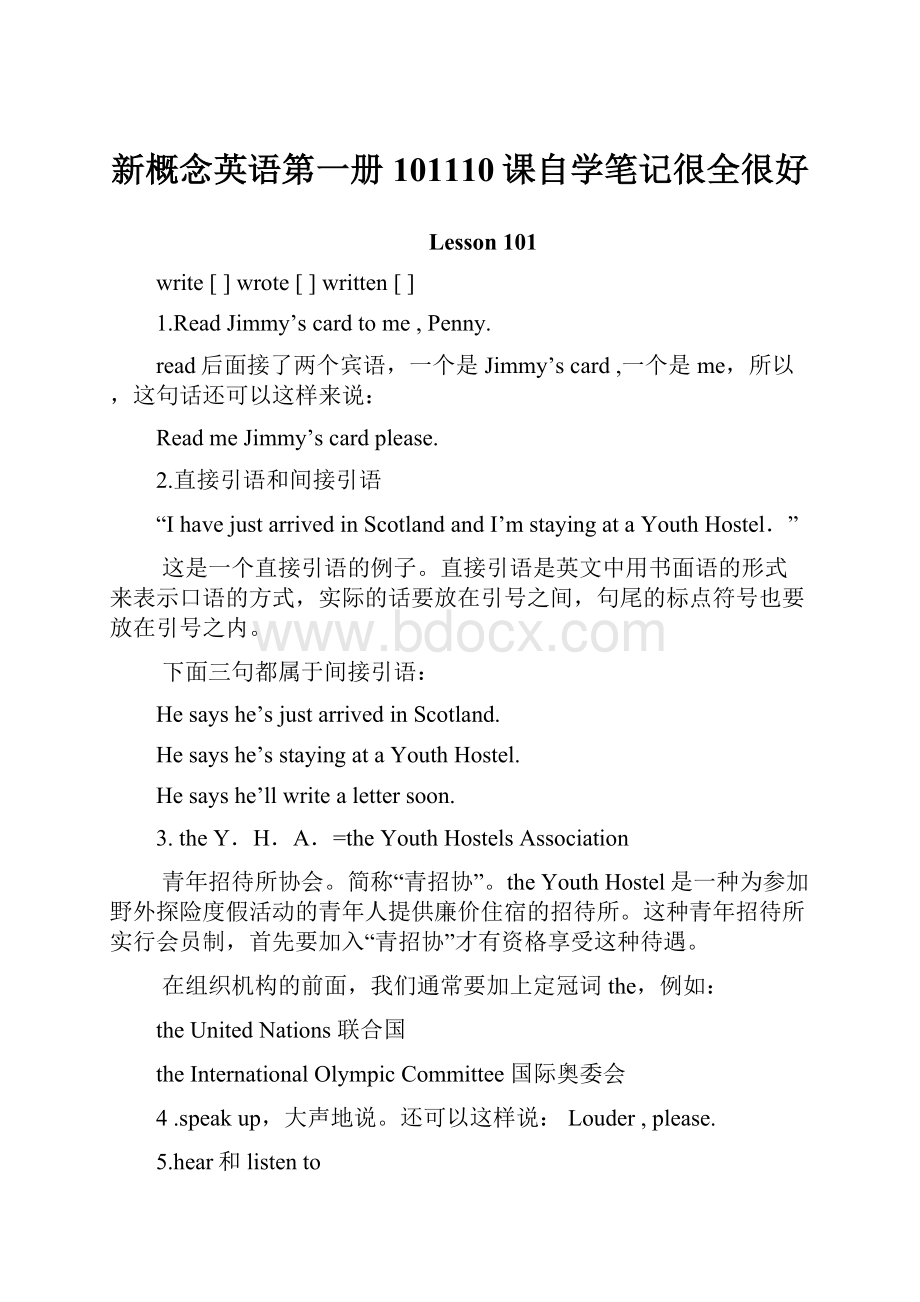新概念英语第一册101110课自学笔记很全很好.docx
《新概念英语第一册101110课自学笔记很全很好.docx》由会员分享,可在线阅读,更多相关《新概念英语第一册101110课自学笔记很全很好.docx(33页珍藏版)》请在冰豆网上搜索。

新概念英语第一册101110课自学笔记很全很好
Lesson101
write[]wrote[]written[]
1.ReadJimmy’scardtome,Penny.
read后面接了两个宾语,一个是Jimmy’scard,一个是me,所以,这句话还可以这样来说:
ReadmeJimmy’scardplease.
2.直接引语和间接引语
“IhavejustarrivedinScotlandandI’mstayingataYouthHostel.”
这是一个直接引语的例子。
直接引语是英文中用书面语的形式来表示口语的方式,实际的话要放在引号之间,句尾的标点符号也要放在引号之内。
下面三句都属于间接引语:
Hesayshe’sjustarrivedinScotland.
Hesayshe’sstayingataYouthHostel.
Hesayshe’llwritealettersoon.
3.theY.H.A.=theYouthHostelsAssociation
青年招待所协会。
简称“青招协”。
theYouthHostel是一种为参加野外探险度假活动的青年人提供廉价住宿的招待所。
这种青年招待所实行会员制,首先要加入“青招协”才有资格享受这种待遇。
在组织机构的前面,我们通常要加上定冠词the,例如:
theUnitedNations联合国
theInternationalOlympicCommittee国际奥委会
4.speakup,大声地说。
还可以这样说:
Louder,please.
5.hear和listento
hear听见,听到强调的是结果
I’mafraidIcan’thearyou.
listento听强调的是动作
Listentome,please.
6.下列从句中,都省略了that。
Hesayshe’sjustarrivedinScotland.
Hesayshe’sstayingataYouthHostel.
Hesayshe’llwritealettersoon.
Youknowhe’samemberoftheY.H.A..
I’mafraidIcan’thearyou.
Ihopeyouareallwell.
Hehopesweareallwell.
7.Love,Jimmy.爱你的吉米。
Yours,Jimmy你的,吉米。
这是朋友间通信时常用的结束语。
8.Hedoesn’tsayverymuch,doeshe?
这是一个反意疑问句
它的回答如下:
No,hedoesn’t.是的,他没有写多少。
Yes,hedoes.不,他写了很多。
ShewenttoParislastmonth,didn’tshe?
Yes,shedid.是的,他去巴黎了。
No,shedidn’t.不,他没有去。
这是英文中的反意疑问句,它是由两部分组成的,前面是一个陈述句,逗号之后是一个简略问句。
反意疑问句可以用来确认自己的判断,获取真实的信息,还可以用来表示惊讶、愤怒等感情。
如果前一部分陈述句是肯定形式,简略问句就要用否定形式;如果前一部分是否定形式,后一部分则用肯定形式。
9.Hecan’twriteverymuchonacard.
Iwritetomyfamilyregularly.writeto给某人写信
Theteacherwrotetheanswersontheblackboard.
10.本课基本句型:
(都省略了that)
I’mafraid…
Hesays…
Hehopes…
I’mafraidIcan’thearyou.
Hesayshe’llwritealettersoon.
Hehopesweareallwell.
11.反意疑问句
肯定式,+否定式?
否定式,+肯定式?
be动词
Thepenisyours,isn’tit?
Yes,itis.No,itisn’t.
Thatwasawonderfulnight,wasn’tit?
Yes,itwas.No,itwasn’t.
Youaren’tateacher,areyou?
Yes,Iam.
No,I’mnot.
一般动词
LucylikesEnglish,doesn’tshe?
Yes,itdoes.No,itdoesn’t.
Tomisskating,isn’the?
Yes,heis.No,heisn’t.
Youdon’tstudyChinese,doyou?
Yes,wedo.
No,wedon’t.
情态动词
Yourbrothercanswim,can’the?
Yes,hecan.No,hecan’t.
Theworkershadtotakethefirstbus,didn’tthey?
Yes,theydid.No,theydidn’t.
Yourbrothercan’tswim,canhe?
Yes,hecan.
No,hecan’t.
现在完成时
Tomhaslivedhereformanyyears,hasn’the?
Yes,hehas.No,hehas’t.
Hehasn’tbeentotheGreatWall,hashe?
Yes,hehas.
No,hehas’t.
12.直接引语和间接引语
当我们引用别人的话时,我们可以用别人的原话,也可以用自己的话把别人的意思转述出来。
当直接引用的句子为不同类型时,间接引用的句式变化很大。
当我们引用别人说话时,若引用的是原话,被引用的部分叫做直接引语。
当我们要引用别人的话语时,可以用自己的话把别人的意思转述出来,被引用的部分叫做间接引语。
直接引语
间接引语
Shesaid,“IlikeEnglishverymuch.”
Mikeasked,“Whenwillourplaneland?
”
ShesaidshelikedEnglishverymuch.
MikeaskedWhentheirplanewouldland.
(1)只须将原话放在引号之中,不做任何改动。
(2)没有时态呼应的问题。
(3)引用原话前可以用,“”,也可以用:
“”。
(4)原话的末尾,按其类别放一个句号或问号等。
(1)不要逗号、冒号、引号。
(2)要考虑到人称的变化。
(3)要考虑到时态的变化。
(4)要考虑到时间状语、地点状语和指示代词的变化。
Hesaid,“I’msleepy.”
Hesaidthathewassleepy.
Shesaid,“Youryoungerbrotherbrokeit.”
Shesaidthatmyyoungerbrotherhadbrokenit.”
Hesaid,“IhavelivedinBeijingsince1950.”
HesaidthathehadlivedinBeijingsince1950.
13.宾语从句
宾语从句在复合句中做主句的宾语。
连接宾语从句的有从属连词、连接代词和连接副词三类词。
这三类词在句中的功能各异,请看下表。
注意:
宾语从句中的语序。
词类
在句中的功能
举例
中文释义
例句
从属连词
that在句中不担任成分,可省略。
that
一般不译
Ibelievethatthishouseisforsale.
Ibelievetheywillarriveshortly.
whether,if在句中也不担任成分,但都不能省略。
whether
是否
Wedon’tknowif/whetherourteacheswillattendtheclassmeeting.
if
是否
连接代词
除了在句中起连接作用外,还在从句中担任成分,做主语、宾语、定语。
who
谁(主格)
Iknowwhodidthegooddeed.[]
whom
谁(宾格)
whose
谁的(所有格)
what
什么,所…..的
Youmusttakebackwhatyousaid.
which
哪个……
HeaskedmewhichshirtIlikedbest.
连接副词
除了在句中起连接作用外,还在从句中担任成分,做状语。
when
什么时候
Iwanttoknowwhentheplanewilltakeoff.
where
什么地方
Heaskedmewherehewouldarrive.
how
怎样,如何……
PleasetellmehowIcangetthere.
why
为什么,……的原因,之所以……
OurteacheraskedmewhyIwaslate.
Lesson102
1.tired
——Whatdoeshesay?
——Hesayshefeelstired.
2.thirsty
——Whatdotheysay?
——Theysaytheyarethirsty.
3.aheadache
——What’sthematterwithher?
——Shesaysshe’sgotaheadache.
4.anearache
——What’sthematterwithher?
——Shesaysshehasanearache.
5.alicence
——Whatdoessheneed?
——Shesayssheneedsalicence.
6.somemoney
——Whatdotheywant?
——Theysaytheywantsomemoney.
7.catch
——Whatmusthedo?
——Hesayshemustcatchthebus.
8.repair
——Whatcanhedo?
——Hesayshecanrepairthisbus.
9.sell
——Whatwillhedo?
——Hesayshewillsellthehouse.
Lesson103
1.Howwastheexam,Richard?
这句话还可以这样说:
Howdidtheexamgo?
2.Nottoobad.不算太坏
Prettygood还不错pretty
3.IthinkIpassedinEnglishandMathematics.我想我的英语和数学及格了。
如果说通过某一个考试,直接用动词pass;如果说通过某一科目,则用passin。
fail不及格
pass/failtheEnglishpaper/test/exam
4.paper这个词当“试卷”讲时,是可数名词。
theEnglishandMathspapers,英文和数学卷子。
paper当“纸张”讲时,是不可数名词。
apieceofpaper.
paper还可以当“论文”讲。
Haveyoufinishedyourpaper?
5.Howabout...?
……怎么样?
相当于我们前面学过的Whatabout...?
用于征求他人意见或询问情况。
Whataboutyou?
HowaboutgoingtoFranceforournextholiday?
6.easyenoughforme,是指对我来说不难,我可以完成和通过。
而toodifficultforme是指对我来说太难了,无法完成和通过。
“for”对于某人来说。
Thehouseisn’tbigenoughforus.
形容词+enoughtodosth.十分(足够)……
She’soldenoughtomakeherowndecisions.
Heisrichenoughtobuyaplane.
enough如果修饰形容词或副词,它必须放在形容词或副词的后面,例如上面两例。
enough还可以做形容词来修饰名词,则放在名词的前面、后面都可以。
Ihavemoneyenoughtobuyadictionary.
Ihaven’tgotenoughmoneytopayforthatcar.
7.ButIcouldn’tanswertherest.
therestofthequeations.
8.Theyweretoodifficultforme.too过于……
too…+forsb/sth+todo…对于某人(某物)来说,太…以至不能…
Thispairofshoesaretoosmallforme.
Thequestionistoodifficultustoanswer.
too+形容词/副词+todo…太…,(以至于)不能(做)…
Heistooyoungtogotoschool.
9.Frenchtestsareawful,aren’tthey?
awful可以形容人或物,表示“很可怕”、“很糟糕”、“很讨厌”。
hate在口语中常用来表示非常强烈的语气。
Ihatethem.
Ihatetrafficjams.我很讨厌堵车
Ihatetellinglies.我讨厌撒谎
10.I’msureI’vegotalowmark.
ahighmark
I’msureI’vedonebadly/well.
11.cheerup,振作起来。
可以用来鼓励你的同学、朋友或同事等。
12.Perhapswedidn’tdotoobadly.toobadly那么糟糕。
13.Theguynexttomewrotehisnameatthetopofthepaper.guy口语中常用,相当于person。
Thepersonbesideme
atthetopof在顶端、在上方atthebottomof在末端、在底端
14.文中的yes?
相当于Andthen?
意思是:
然后呢?
然后怎么了?
15.Thenhesatthereandlookedatitforthreehours.forthreehours连续三个小时。
16.本课基本句型
Icouldanswerthequestions.
Theywereveryeasy.
Icouldn’tanswerthequestions.
Theyweretoodifficult.
Thequestionwereeasyenoughformetoanswer.
Thequestionweretoodifficultformetoanswer.
17.名词
(1)名词的种类
分类
例词
专有
名词
指人、地方、团体、机构等特有的名称。
它的第一个字母必须大写。
专有名词前一般不加冠词。
表示人名
LiBai李白LuXun鲁迅
Mr.Dick迪克先生ChairmanHu胡主席
表示地名
China中国Changanstreet长安街
London伦敦ZhongshanPark中山公园
由普通名词构成的专有名词
theUnitedStatesofAmerica美国
theSummerPalace颐和园
普通
名词
指一类人或东西或一个抽象的名称。
可数名词
个体名词
表示某类人或事物中的个体
studentteacher
carpanda
集合名词
表示若干个体组成的集合体
familypolicearmy
teamcrowdgroup
people
不可数名词
抽象名词
表示动作、状态、品质、感情等抽象的概念
musiccoldlove
restpower(威力)
物质名词
表示无法分为个体的物质或实物
waterteaair
firerainwood
(2)单数可数名词
①如果我们要表示一本书,一只鸟,一棵树等概念时,要用名词的单数形式。
表示名词的单数,要在名词前加不定冠词a或an。
例如:
abirdanegg
Thisisadesk.
Thereisanorangeonthetable.
②a和an的使用区别
a
以辅音开头的名词前
abookapenaneworange
an
以元音开头的名词前
anappleanolddeskanorange
(3)复数可数名词
①规则变化
规则变化
例句
1
在一般情况下,词尾后加-s
在清辅音后读[s]
book—books[]cup—cups[]
在浊辅音和元音后读[z]
bed—beds[]
其它
Boys[]horses[]pages[]
2
以s、x、ch、sh结尾的词,加-es,读作[iz]
bus—busesbox—boxesdish—disheswatch—watches
[][][][]
3
以f或fe结尾的词,先将f或fe变成v,再加-es,读作[vz]
half—halves[]wife—wives[]
4
以o结尾的词,词尾加es或s,都读[z]
hero—heroes[]potato—potatoes[]tomato—tomatoes[]
zoo—zoos[]piano—pianos[]photo—photos[]
5
以辅音字母加y结尾的词,先将y改为i再加es,读[iz]
city—cities[]family—families[]
6
以元音字母加y结尾的词,直接加s,读[z]
day—days[]boy—boys[]
7
以th结尾的词,在词尾加s
th读[],加上s读[]
th读[],加上s读[]
mouth—mouths[]path—paths[]
month—month[]
②不规则变化
不规则变化
例词
1
元音发生变化
man—men[]woman—women[]foot—feet[]
tooth—teeth[]mouse—mice[]goose—geese[]
2
词尾发生变化
child—children[]
3
单、复数形式不变
fishsheepdeerChineseJapanese
4
有些名词只有复数形式
clothes衣服trousers裤子glasses眼睛等Yourtrousersareoverthere
③合成名词变为复数时
变化
例词
1
把第一个或最后一个词变成复数
highway—highwaysgirlfriend—girlfriends
son-in-law—sons-in-law女婿
2
把构成合成名词的两个词都要变为复数
mandoctor—mendoctors
womanteacher—womenteachers
(4)名词的用法
名词在句中可以担任除谓语外的任何成分,即主语、表语、宾语、状语、宾补、定语等
例句
说明
1
Chinaisagreatcountry.
名词作主语
2
I’mastudent.
名词作表语
3
Allofuslovepeace.
名词作动词宾语
4
Theyarelisteningtomusic.
名词作介词宾语
5
YoushouldstudyEnglishstepbystep.
名词作状语
6
Thepartylastedtwohours.
名词作状语
7
OurschoolnamedourclassLeiFengclass.
名词作宾补
8
Thisisourteachers’office.
名词所有格作定语
9
Tenminutes’walkisn’tlong.
名词所有格作定语
Lesson104
1.cleveranswerallthequestions
Couldheanswerallthequestions?
Yes,hecould.
Hewascleverenoughtoanswerthem.
2.stupid[]answerallthequestions
Couldheanswerallthequestions?
No,hecouldn’t.
Hewastoostupidtoanswerthem.
3.cheapbuythecar
Whycouldhebuythecar?
Becauseitwasverycheap.
4.expensive[]buythecar
Whycouldn’thebuythecar?
Becauseitwastooexpensive.
5.loud[]hearthestereo
Whycouldtheyhearthestereo?
Becauseitwasveryloud.
6.lowhearthestereo
Whycouldn’ttheyhearthestereo?
Becauseitwastoolow.
7.sweeteattheorange
Couldsheeattheorange?
Yes,shecould.
Itwa